Months of Meryl: Plenty (1985)
 Thursday, March 15, 2018 at 1:00PM
Thursday, March 15, 2018 at 1:00PM John and Matthew are watching every single live-action film starring Meryl Streep.
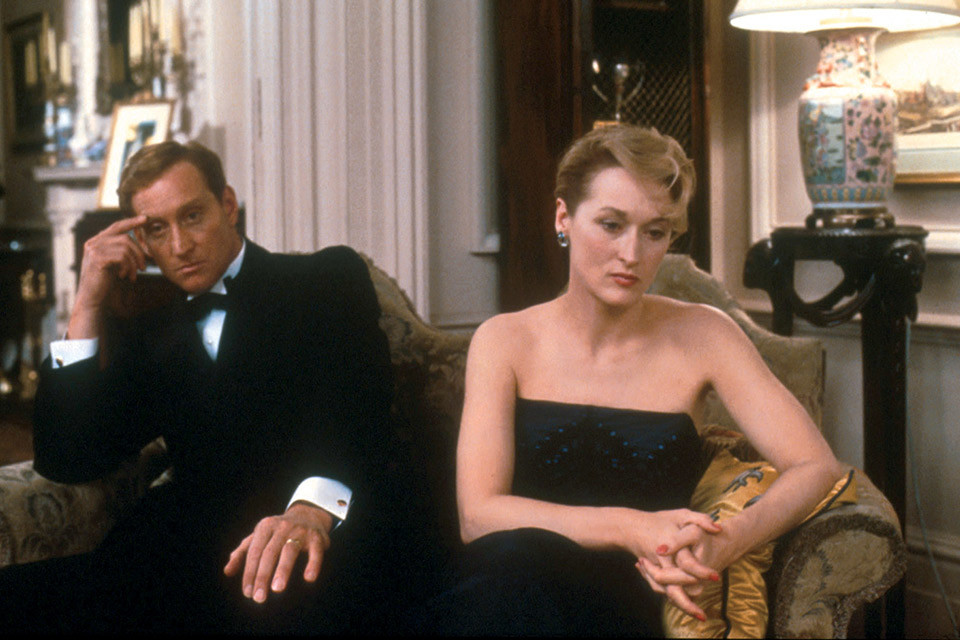 Charles Dance and Meryl Streep in "Plenty"
Charles Dance and Meryl Streep in "Plenty"
#11 — Susan Traherne, resistance fighter turned diplomat’s wife with a gnawing sense of unease about the life she must lead.
MATTHEW: “I just wish she were more ordinary,” a persnickety commercial director grumbles about an offscreen model hired to play the mother in a promo for dog food. “Will the audience identify?” he frets. We’re in England in the postwar 1940s and Susan Traherne, a former agent in the French resistance, is rolling her eyes through a mind-numbing advertising job that she will promptly vacate. The scene is quick but Susan walks out just in time for the director’s comments to resonate as a sly statement on the woman herself, the reliably erratic anti-heroine played by Meryl Streep in Fred Schepisi’s tepid cinematic adaptation of David Hare’s Plenty. Will an audience identify with a figure so brazenly, even coldly unconventional? And does such identification even really matter...?
Hare’s play first premiered in 1978 in the West End with the underrated Canadian actress Kate Nelligan in the lead as Susan, delivering a tour de force that later on Broadway inspired the New York Times’ Frank Rich to advise, “Only a fool would hold his breath waiting to see a better performance this season.” Plenty eventually made it to the screen in September of 1985 with Streep in tow. The film sets out to tell a story that is more complexly ambitious than the majority of Streep’s cinematic undertakings thus far — but that doesn’t necessarily make it a good film.
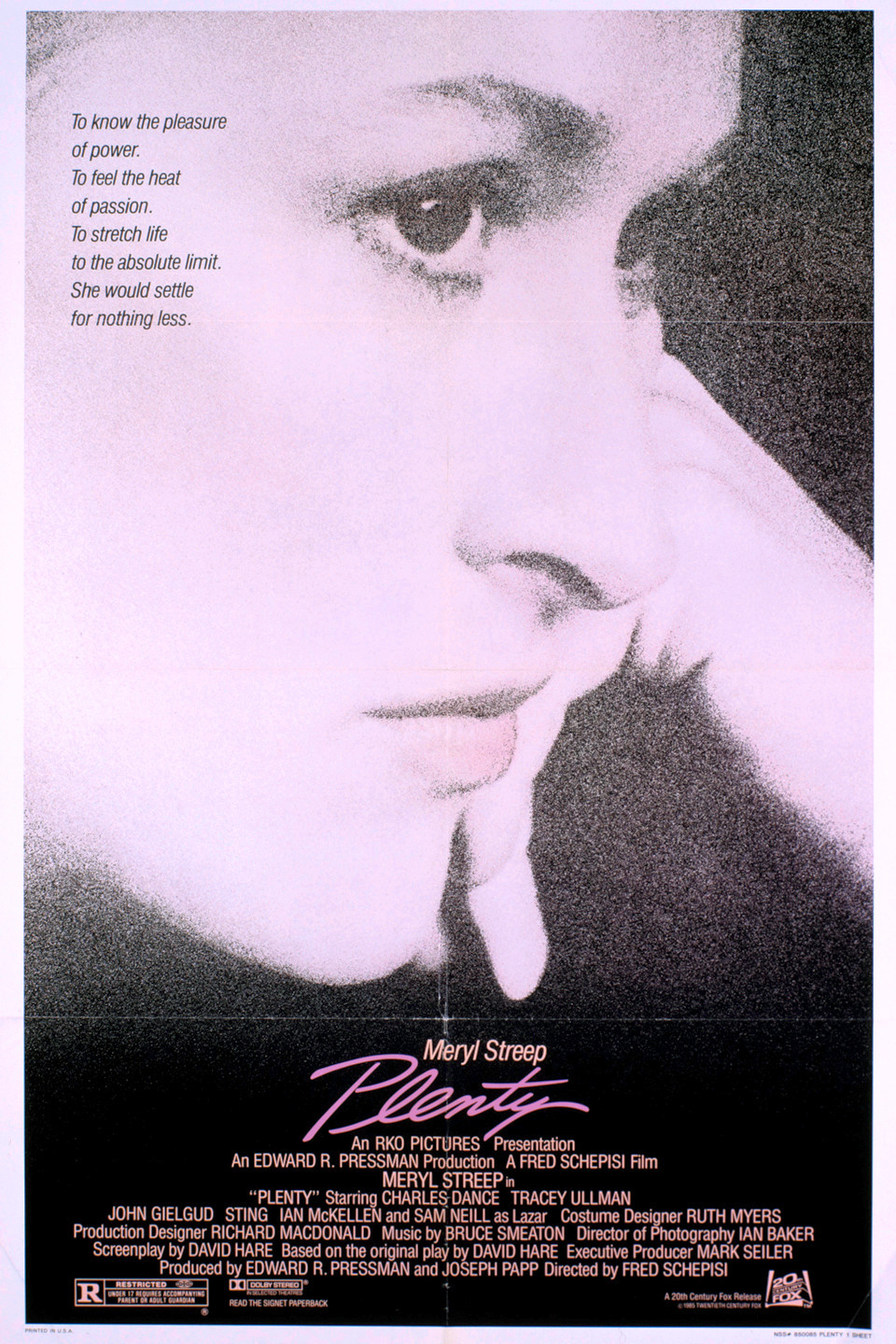 Plenty is a scattered inquiry into a highly-specific case of difficult womanhood, but the film itself is often a defective experience. Schepisi and Hare, who adapted his own work, have all the necessary ingredients for a daring and dynamic piece of cinema, one intriguingly centered around a fundamentally prickly persona, given life by a incomparable master of many guises. But the whole never coheres and, sadly, neither does Streep’s performance, which is neither an out-and-out catastrophe of miscasting (as in Still of the Night) nor a half-shaded interpretation of an already vague character (as in The French Lieutenant’s Woman). As Susan continually dislodges herself from different emotional planes and states of mind, Streep’s perpendicular posture and plummy accent, defined by cadences that are crisply studious but also unusually strained in a style only befitting the stage, remain the same. Other actors, including Charles Dance (as the low-level diplomat Susan will eventually marry) and Tracey Ullman (as her forthright confidante), seem in awe of Streep and arouse a cool, scowling remove in her own performance that doesn’t always suit this badly-behaved skeptic.
Plenty is a scattered inquiry into a highly-specific case of difficult womanhood, but the film itself is often a defective experience. Schepisi and Hare, who adapted his own work, have all the necessary ingredients for a daring and dynamic piece of cinema, one intriguingly centered around a fundamentally prickly persona, given life by a incomparable master of many guises. But the whole never coheres and, sadly, neither does Streep’s performance, which is neither an out-and-out catastrophe of miscasting (as in Still of the Night) nor a half-shaded interpretation of an already vague character (as in The French Lieutenant’s Woman). As Susan continually dislodges herself from different emotional planes and states of mind, Streep’s perpendicular posture and plummy accent, defined by cadences that are crisply studious but also unusually strained in a style only befitting the stage, remain the same. Other actors, including Charles Dance (as the low-level diplomat Susan will eventually marry) and Tracey Ullman (as her forthright confidante), seem in awe of Streep and arouse a cool, scowling remove in her own performance that doesn’t always suit this badly-behaved skeptic.
Streep, who has never looked lovelier, certainly erects a confident, put-together facade, but she never comfortably settles into the character. The performance improves in ways I’ll detail later, but I never lost the impression that a role like Susan requires a far more mysterious actress whose performative choices and emotional vulnerability are a little less evident. What say you?
JOHN: Color me surprised that when Meryl Streep-as-Susan Traherne utters, “I have a weakness — I like to lose control,” I sit hopelessly unconvinced. Because this late-film statement rings false to any viewer mindful of the glaring disconnect between the role’s requirements and the performance itself, Plenty stands as the ultimate failed test in Streep’s early career and a clear indication of her limitations. Meryl Streep can do anything... except possibly lose control. I don’t mean to come down harshly on Streep; Susan Traherne must read like a compelling role, and it’s not that the actress has proved herself entirely unable to self-destruct or walk the plank of emotional abandon before. But she gets little help from the filmmaking itself with its staggered time jumps, stagey wide frames, and dull cinematography. She sticks out like a sore New Jerseyan among her British costars. Still, I expected a major unraveling.
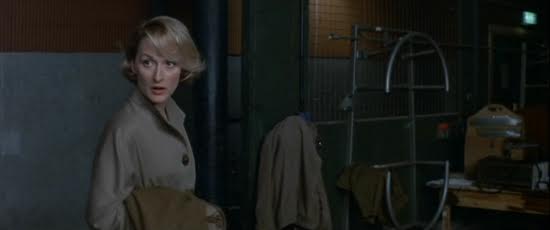
I commend Streep's refusal to soften this abrasive character, whether she's firing random gunshots at Sting or peeling off wallpaper or practically burning down the house at her husband’s dinner party. In quieter moments, Streep does manage a portrait of a woman bogged down by unfulfilled hopes and the banal realities of working at jobs well below her capabilities. But in Plenty her knack for emotional transparency becomes an odd fit for a role that requires high-wire concealment of an unnerving and ultimately disruptive well of sadness, the type of characterizations that actresses like Jessica Lange or Judy Davis frequently mastered during this era. We’re meant to believe that Susan’s post-resistance life continually clashes with her headstrong and volatile persona, but this spark noticeably flames out for a majority of Streep’s performance.
“I’m grateful for anything that’s got a little life in it,” Susan tells bohemian pal Tracey Ullman, who is both livelier and more convincingly British than Susan. I kept waiting for Susan to drop more vivid hints that she’s much too spirited for the life she leads, but Streep is often just too placid, dialling down when she might have had more luck dialling up. A majority of her performance floats in and out of different British inflections, her accent work noticeably overcompensating for her being the only American in this tony English cast. Most distressingly for the pedigree of the role and project, Plenty is one of the first times I actually felt bored by a Meryl Streep performance.
Thankfully, it's not an entire wash. If you forget about things like consistency or coherence, certain moments do impress. When Streep watches Sam Neill ride off to another post, she looks forlornly at both her short-lived romance and all the excitement that goes along with it in a wordless close-up perfectly suited to the role and her strengths. Midway through the film, Susan now finds herself working for Queen Elizabeth’s coronation committee. She trims her hair short, dresses like a Hitchcock blonde, and seems to be thriving in a career and milieu more suited to her supposedly voracious personality. In perhaps her best scene, Streep consigns Sting to have her child, meeting up with this acquaintance after years apart, with only a tenuous prior connection between them. Although single, Susan wants to be a mother and raise the child with her friend. “I don't see why I should compromise,” she says, steely and without a shred of naïveté. Streep and Sting share palpable chemistry in this seduction scene, even though Susan registers as a completely different character. Hare’s time jumps constantly undercut Streep’s character development, offering spare episodes for her to try her hand at without providing any conjoining links with which the actress might deepen Susan’s emotional progression. I suppose one could make a case that the spike in Susan’s depression coincides with her rise up the social ladder, but this doesn’t seem deliberate, much less probed.
What do you see as Streep’s greatest setbacks or triumphs in the part?
MATTHEW: Lange and especially Davis are particularly inspired recasting possibilities on your part, not least because they famously tend to paint in bold strokes; this technique might not necessarily expose anything deeper about Susan but it would at least make a more striking impression. Although I’ve watched Plenty only once, it’s clear to me why a more understated actress like Streep or an altogether gauzier one like Rachel Weisz, whose interpretation of Susan in the Public Theater’s 2016 revival was largely met with pans, might have a tougher go of making sense of this proud but elusive neurotic. If you had trouble buying “I like to lose control,” an arch, late-stage admittance that indeed only rings half-true, then I was even more baffled at the question Dance’s diplomat poses to Susan early on in the film: “You don’t think you wear your suffering a little heavily?”

Streep’s Susan doesn’t wear any emotion too heavily, mostly because the film’s infuriating ellipses make such concentrated, inward explorations all but impossible. That being said, I don’t think the performance is anywhere near a total wash, especially since Susan’s descent into mental illness unearths a more thrillingly unpredictable spirit that Streep cannot help but occasionally spark to, prompting small but significant ruptures in the character’s generally stolid exterior. She aces the breezy lustiness of the character, whose multiple dalliances make for some of the movie’s more engaging passages, particularly her almost-romance with Sam Neill’s dashing fellow fighter that bookends the film. I also admired the eerily sedated quality Streep brings to her scenes in Jordan, in which Susan is temporarily coaxed into playing the dutiful diplomat’s wife. She’s also great in a long, two-handed exchange with Ian McKellen, playing her husband’s superior, in which Streep bristles with white-hot exasperation at the latter’s haughty tactics of evasion.
Best of all, however, is an earlier, centerpiece dinner party sequence that finds a newly-married Susan needling another of her husband’s superiors (played by that notoriously subtle scene-stealer John Gielgud) with poised peacock pride over his (alleged) involvement in the Suez Canal Crisis. This ultimately gives way to a self-righteous monologue, shot in extended close-up, that becomes a contained performance unto itself, one that Streep deftly negotiates, her cerebral instincts a perfect fit for this crucial dressing-down.
Otherwise, I find little else that’s truly stirring in Susan Traherne, who could have ideally manifested as a freedom-fighting Mabel Longhetti with surer artists both in front of and behind the camera. This barely-coping sometimes-madwoman would have definitely benefited from a nervier interpreter. This quote, provided by Streep to on-set reporters, may help us understand why she's unusually tentative here:
“Playing a character as I am, who is uncompromising in the demands she makes on herself and on other people, I really have to come up to that challenge and it tests my mettle. When the stakes are so high, when everything is a matter of life or death, and you don’t know if you’re going to see each other the next day or not, or if there’s going to be a next day, I think that life has richness and things matter.”
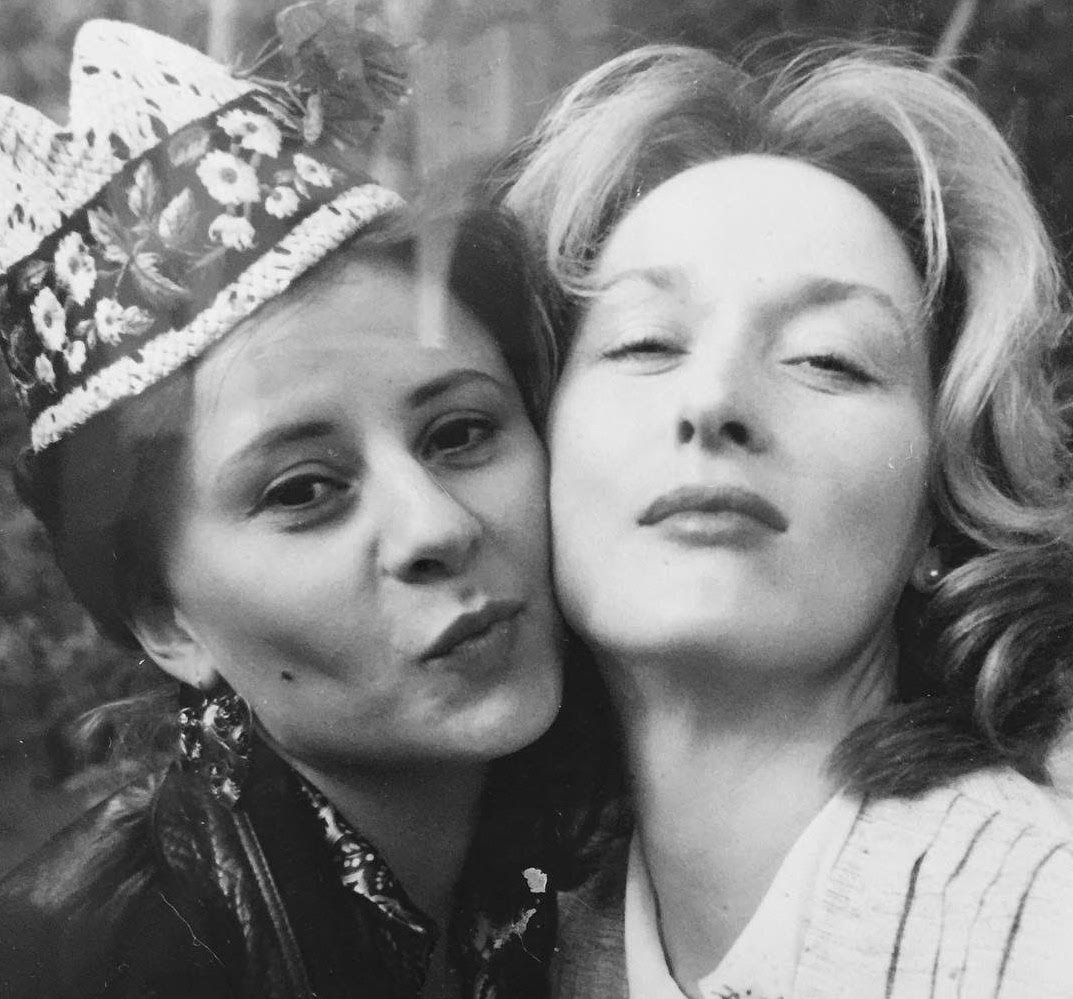 Tracey Ullman and Meryl on the set of "Plenty"
Tracey Ullman and Meryl on the set of "Plenty"
Plenty certainly tests Streep’s mettle, but it also exposes a humbling quality about the actress that is perhaps best summarized by a pithy but profound quote from Philip Seymour Hoffman, taken as part of a larger statement: “Actors are responsible to the people we play.” Even at this somewhat early juncture in her career, it’s clear that Streep keenly understands this responsibility and feels indebted to her characters with an overwhelming urgency that sets actors like Streep and Hoffman apart from the herd. Streep displays a palpable respect for so many of her characters, as well as a fundamental need to honor their circumstances as best she can.
Here’s another quote from Streep, regarding Susan:
“I loved her anger and the size of it and her fearlessness in expressing it. And I also was attracted by the dream inside of her, and the idealism. To me, she seemed like someone who all through her life up to middle age just doesn’t stop being as altruistic as only teenagers are, and obnoxious about the purity of the world. I think we’ve seen a lot of heroes in literature and in drama, men who ask a lot of their circumstances, and of society and the world, and who are demanding, aggressively so. I don’t think that’s unusual; what I think is unusual is that it’s a woman.”
It’s easy to understand and appreciate Streep’s interest in Susan, a character so radical in conception that she shares DNA with everyone from the aforementioned Mabel Longhetti to A Doll’s House’s Nora, who, like Susan, also ends her journey by defiantly walking away from her marriage. But do you think Streep revered Susan’s iconoclasm too strongly to actually breach the barrier between actress and character, and thus playing a heroine when she should have been investigating the rougher, less sympathetic components of the character? What exactly is it about Susan that prevents Streep from inhabiting her with the sustained and immersed conviction endowed to, say, Joanna Kramer or Karen Silkwood? Can this all just be chalked up to bad writing and direction?
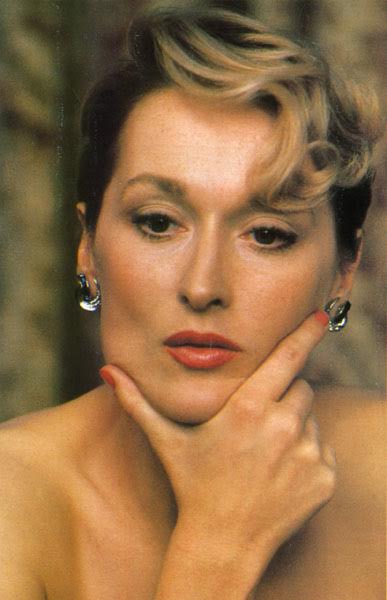 JOHN: The short answer might be yes? I don't necessarily see Streep actively pushing back against exploring Susan’s less tolerable attributes. It instead seems as though Hare’s episodic screenplay and Schepisi’s muted direction just didn’t facilitate the immersed conviction and rougher edges that the role requires. In those quotes you've pulled, it's clear that Streep relished the opportunity to create a warts-and-all protagonist who is both heroic and flawed. Perhaps she scales back her performance in a tactical move, refusing to slip into fits of madness so as not to diminish the struggles of this conflicted woman. While I do agree that the dinner scene is a highlight of her performance, I wonder if we appreciate it solely as a respite from the overarching boredom of much else that surrounds it, excusing the sheer lunacy of Susan’s imperviousness, which Streep slips on like a mask, untethered though it may be from what we have come to expect from the character. The scene just reminds me of how great Streep can be when she’s on, but I’ve already largely forgotten the specifics of either Susan or the scene’s circumstances, a pattern that has become apparent in discussing Plenty. Nearly every highlight from this performance has the effect of caffeine waking one up from a dull snooze, offering fleeting jolts of verve as well as recollections of what Streep can do but, for the most part, fails to do here. Maybe allowing the viewer to experience the dashed hopes and disappointment that Susan feels is the film’s ultimate achievement.
JOHN: The short answer might be yes? I don't necessarily see Streep actively pushing back against exploring Susan’s less tolerable attributes. It instead seems as though Hare’s episodic screenplay and Schepisi’s muted direction just didn’t facilitate the immersed conviction and rougher edges that the role requires. In those quotes you've pulled, it's clear that Streep relished the opportunity to create a warts-and-all protagonist who is both heroic and flawed. Perhaps she scales back her performance in a tactical move, refusing to slip into fits of madness so as not to diminish the struggles of this conflicted woman. While I do agree that the dinner scene is a highlight of her performance, I wonder if we appreciate it solely as a respite from the overarching boredom of much else that surrounds it, excusing the sheer lunacy of Susan’s imperviousness, which Streep slips on like a mask, untethered though it may be from what we have come to expect from the character. The scene just reminds me of how great Streep can be when she’s on, but I’ve already largely forgotten the specifics of either Susan or the scene’s circumstances, a pattern that has become apparent in discussing Plenty. Nearly every highlight from this performance has the effect of caffeine waking one up from a dull snooze, offering fleeting jolts of verve as well as recollections of what Streep can do but, for the most part, fails to do here. Maybe allowing the viewer to experience the dashed hopes and disappointment that Susan feels is the film’s ultimate achievement.
By the end, Susan remains in the abstract. I experienced a majority of the performance as Streep playing an idea about a woman, an era, and a country rather than giving life to a flesh-and-blood woman like so many other characters she's etched into being. It’s much more interesting to discuss Plenty in the theoretical — as there are only so many beatings this dead horse can withstand — and how it fits into the emerging patterns of Streep’s career. Susan Traherne joins the scores of difficult women that form Streep’s filmography and reinforces the key feminist thread that runs throughout most of her films during this period. In her quest to find high-quality literary roles that challenge both audience expectations and her own capabilities as an actress, Streep sometimes gambles on the pedigree of the project alone and produces lukewarm, affected, yet always well-intentioned efforts. At the height of her career, it’s telling how Streep refuses to sell herself short in bombastic blockbusters or exploitative sex thrillers or other meaningless drivel, choosing instead esteemed plays and books and the stimulating characters within them. This is what I will remember about Plenty, even though, as Susan admits, “I want to change everything but I don’t know how.”




Reader Comments (32)
Wow, I guess I need to see this again because I recall it as terrific and my favorite undersung Streep performance.
Mmmm.... Meryl is very pretty in this.
No Heartburn?
Oops...I thought Heartburn was an '84 release. It's '86.
Well, that first still perfectly tells my feelings of this film. I just can't understand the praise. For me it was overall just... pointless.
I know people hate Out of Africa, but I think she got rightfully nominated for that.
I did not like this role and I loved her in Out of Africa.
There are great bits in this movie, but I agree that overall the material does not lend itself to a film. It's very much a David Hare play, and I don't know that any actress could have made Susan compelling, understandable or memorable when the character is very much internal and unhappy. Still, I love the scenes with Streep, Sam Neill, Sting, John Gielgud and Tracey Ullman, and sometimes the cinematography is beautiful. If no one wants to watch the movie, I recommend they at least watch the YouTube clip of the disastrous dinner party. And Charles Dance ... what happened on set and why did Streep and Ullman dislike him? Maybe it was method acting, and he and Susan were supposed to hate each other, but we may never know.
Better as a stage play. Streep is so beautiful in it but think her performance suffers more from the direction and adaptation itself. I also think that “losing control” does not need a gone mad Lange sized performance more in the “ when things are going great, I need to destroy and move on”. Susan is lost and can not get over the one time she had excitement in life and nothing comes close.
Sometimes when a performer has a smash hit on stage with a new play, it happens that:
a) the performer gets a film role they are not suited for, and everyone says huh, I don't see what the fuss is about that performer.
b) the play is made into a film with someone else in the role, and everyone says huh, I don't see what the fuss is about that play.
I can't think of a single instance (can you?) where Meryl Streep has done the film role someone else did in the play, where Meryl's performance hasn't turned out to be a dud. And people speak wistfully of the original performance of Cherry Jones, Kate Nelligan, Bernadette Peters, etc.
My firmly held theory: Meryl Streep is a genius at show business.
Whenever one of Meryl's movies fails to cohere, it's always someone else's fault. The director, the writer, the script, the co-stars, the editing, the wrong publicity, etc. It seems like hardly anyone comes out of these movies without taking a career or reputation hit.
So when we puzzle why Streep's filmography doesn't include more distinguished directors, maybe because it's rare that the directors come out of it with an enhanced reputation.
I don't know that is true, Adri. There is no guarantee that the exact stage actor would have done a better job on film, and in most instances, the studios would never have financed it with no guarantee of making any money. It's harder than people think to carry a film. With Streep doing the movie, the playwright's text stays in ongoing conversation. And I have not heard any complaints from Hare, Shanley, Letts, etc.
Miranda Richardson would make a great Susan.
Yes, or a Claire Foy, but would audiences want to go on that ride with Susan? She was kind of a depressed, angry mess.
I never had the fortune of watching Kate Nelligan perform this role but I did manage to catch the other Cate (Blanchett) whilst on a business trip to Australia. She was phenomenal and I think that was even before she broke into the US market (or maybe it was around the time of Elizabeth the first movie, I can't recall).
I regret to say I saw Cate in Plenty in London summer '99 and I fell asleep (jet lag). I got lucky and I got to make up for it by catching her at BAM in Streetcar.
guys, this is such a wonderful, smart, insightful essay on streep overall. really intelligent, perceptive writing...thanks for the hard work you put into it.
interesting point by Adri above. meryl is the greatest actress ever probably, but her work in DOUBT lacked the subtlety of Cherry Jones; in INTO THE WOODS lacked the wit of Bernadette Peters; and in AUGUST: OSAGE COUNTY lacked the lacerating brutality of Deanna Dunagan. All three actors were in another league than Streep in those roles. I obviously get the economics of why this happens, but having three weak directors at the helm of those movies didn't help meryl either.
don't get me wrong: she's so brilliant, i love her with all my heart. but this article is a loving and respectful and exciting take on this performance, for sure.
My only comment is that a stage production and a movie adaptation of a play are completely different animals. I understand how people get attached to their experience of a stage performance, but that person or live theater experience will not necessarily transfer to film. Even filmed versions of live plays are often lifeless because you are not in the theater. These works will hopefully be remade in the future - in film or theater - if they have value.
This performance is so boring, and Out of Africa is one of her greatest.
Kate nelligan made an indelible impression on me, so this is one role where Streep was second best, but looked great.
I love her in Out of Africa, I don't care what anyone says - that was worthy of a nomination.
I loved this film when it came out and think Streep's dinner party scene is one of her greatest moments on film.
Love the dinner party scene and I think Streep's performance in Doubt is outstanding.
I like Streep but I've never, ever thought of her as "understated" actress, as one of you comments.
Not one of her best though I do love the scene where she unravels in front of Tracey and Sting (“You don’t understand- you don’t understand the figures in my mind!”)
She also looks stunning with the shorter ‘do she sports in the first half of the film.
And any film that made her lifelong besties with Tracey!
But my favorite thing about this movie is the score by Bruce Smeaton. He also did the score for ‘A Cry In The Dark”.
Meryl looks great in the period clothing and hairstyles and it's interesting to see her paired with someone as distinctive as Tracey Ullman but this is a chilly, distant performance and film.
Even with that taken into consideration it's still great to see this obscure film get a thorough look.
You should publish this series with a film school like UCLA. It would make great curriculum with clips. Triggers good memories. I have seen foreign edited versions of her films that are incredible, because they kept all the good parts and dropped the boring parts. They edit for an audience that shows the year on the bottom, etc. so you don’t guess year with hairstyles! Streep and Sting for example were oddly pornographic in her amazing dress, also scene with Ian McKellen very good. Thank u
My all-time favourite Streep performance. Enjoyed reading your takes on it, and perhaps it hasn't aged well, but it's the one that affected me the most when I saw it 30+ years ago.
The final "days and days..." speech was/is heartbreaking and the subsequent years have only amplified that.
Brandz: Doubt is a film that greatly improved for me on a second viewing.
Michael R: I don't understand why Doubt, as a film, gets such a bad rap. Outstanding scene after scene, wonderful cast, all Oscar nominated BTW (X4). Streep was the nun that everyone I grew with knew and hated. I suppose everyone has different tastes and opinions but this film is just a standout for me, and Streep's performance is so raw and real. Plus, I love the final scene.
@brandz
I'm not quite high on Meryl's Performance in Doubt, but I don't get the hate for it either. It's quite Divise I've learned, but the film was definitely BP-worthy imo. Though most didn't like Amy Adams in that and for me she actually has the most complex role. I also never understood why PSH was placed in Supporting. He was as lead as Meryl. Period. But it's a strong Ensemble film.
I really love Meryl in ITW. Might be my favorite nom this decade. She was so much fun and killed Last Midnight.
One of the BEST Streep performances. Without a question.
better than the Out of Africa performance on every single level.
It's a top 5 Streep performance, easily.
This one is good for acting and dialogue. I reread Ebert’s review and found myself agreeing with him. I actually value Ebert more than Kael, truth be told. I liked her writing but she was often wrong. I also recommend this plus Collateral to see more on how Hare’s writing is great for actors, and how history can be dramatized.
80’s Era Meryl will always be my favorite, but I find both the movie and lead performance in PLENTY forgettable. (Rachel Weisz was magnificent as Susan in the Public Theatre’s revival of the play a couple of years ago. I would have loved to have seen Kate Nelligan’s original performance!)
DOUBT features my least favorite 21st Century Meryl Streep performance (and nomination). She pushes way too hard throughout; the “you will mistake me” scene where she holds her cross up to the much missed Philip Seymour Hoffman truly made me cringe. I often theorize that Kate Winslet might still be Oscarless if Cherry Jones had the opportunity to transfer her brilliant original stage performance of Sister Aloysius to the screen. (I believe Cherry’s successor in the role, Eileen Atkins, would have also duplicated her magic onscreen if given the chance.)
Plenty is an astonishing piece of timeless art. It's not possible to find another film that so aptly defines the failures of the 20th century. Susan Traherne does not "join" the ranks of "difficult women" (pop culture code for unbending female protagonists), she is their reigning Queen. So, you cannot work her out; or she doesn't satisfy you; or they didn't typecast an actress already known for "brittle" performances? Well guess what? That unsettling, unresolved feeling you can't shake is the echo of Beckett at work. That yearning for a bit of schmaltz for you to hang your popcorn bucket on as we all descend into madness with Susan is the call that's echoed in Atonement, which could have been as good if it was half as courageous. You don't get The Hours if you reject Plenty, and you'll have to give back Damage and be happy with only Tom and Viv to record the volcanic anger of the first generations of women who slammed doors into the faces of their husbands. The point is that Susan does not satisfy you, and the point is that men try to steal her thunder, like Gielgud's gorgeous line of questioning about gouaches. Streep deftly wields the meat cleaver while Susan Traherne carves the underpinnings of Empire asunder. Plenty is a divine banquet and everyone is still asking for more. Mission accomplished.